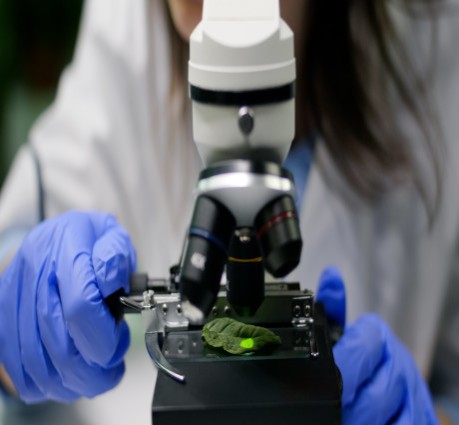The program of M.Sc. Botany is designed with an objective to encourage and support the growing demands and challenging trends in the educational scenario. The program focuses on the all-round development of the students to face the competitive world. The objectives of the program are as follows: To understand the scope and significance of the discipline. To imbibe love and curiosity towards nature through the living plants. To make students open-minded and curious, we try our best to enhance and develop a scientific attitude. To make the students exposed to the diverse life forms. To make them skilled in practical work, experiments, laboratory equipment and to interpret correctly on biological materials and data. To encourage the students to do research in related disciplines.
Duration of Program
Level of Study

Algae, bryophytes, pteridophytes, gymnosperms, viruses, bacteria, and fungi
Morphology, anatomy, and taxonomy of angiospermic plants, Plant structure, and development
Plant physiology, Biochemistry, Gymnosperms, Resource utilisation, and genetics
Biotechnology and tissue culture; Molecular biology of plants
PO1 Critical Thinking : Take informed actions after identifying the assumptions that frame our thinking & actions.
PO2 Effective communication : Speak, read, write & listen clearly in person and through electronic media in English and in one Indian Language, and make meaning of the world by connecting people, ideas, books, media and technology.
PO3 Social interaction : Elicit views of others, mediate disagreements and help reach conclusions in group settings.
PO4 Effective citizenship: Demonstrate empathetic social concern and the ability to act with an informed awareness of issues and participate in civic life through volunteering.
PO5 Ethics : recognize different value systems including your own, understand the moral dimensions of decisions and accept the responsibility for them.
PO6 Environment and sustainability : Understand the issues of environmental contents and sustainable development.
PO7 Self-directed and long-life learning : Acquire the ability to engage in independent and life-long learning in the broadest context of socio-economic and socio technological changes & develop an aptitude for continuous learning and professional development with ability to engage in microbiological practices and education program.
PO8 Knowledge : Provide basic knowledge for understanding the principles and their applications in the area of Microbiology, Instrumentation & Technology.
PO9 Technical Skills : Develop an ability to use various instruments and equipment with an indepth knowledge on standard operating procedures for the same.
PO10 Research & Development : To Demonstrate knowledge of identifying a problem, critical thinking, analysis and provide rational solutions in different disciplines of Microbiology & microbiological Sciences.
PO11 Modern Tool Usage : Develop appropriate technique, resources and IT tools for prediction and modelling to complex issues of microbiology.
PO12 The Society : Apply regional microbiological reasoning informed by the contextual knowledge to comprehend and receive instructions on safety and the consequent responsibilities relevant to the society as well as social well being.
PO13 : Problem analysis
PO14 : Conduct investigations of complex problems
PO15 : Design/Development of Solutions
PO16 : Individual and Teamwork
PSO1 : Identification and taxonomy of plants through different taxonomic description of plants.
PSO2 : To get a better understanding of different families of plants in the angiosperms and gymnosperms.
PSO3 : To get the techniques involved in plant tissue culture and plant breeding.
PSO4 : To perform a detailed study about the different types of microbes viz. Bacteria, Cyanobacteria, algae and fungi.
PEO1 : To understand the scope and significance of the discipline.
PEO2 : To imbibe love and curiosity towards nature through the living plants.
PEO3 : To make students open-minded and curious, we try our best to enhance and develop a scientific attitude.
PEO4 : To make the students exposed to the diverse life forms.
PEO5 : To make them skilled in practical work, experiments, laboratory equipment and to interpret correctly on biological materials and data.
PEO6 : To encourage the students to do research in related disciplines.
PEO7 : To develop the ability of the students to transform the society through their education.